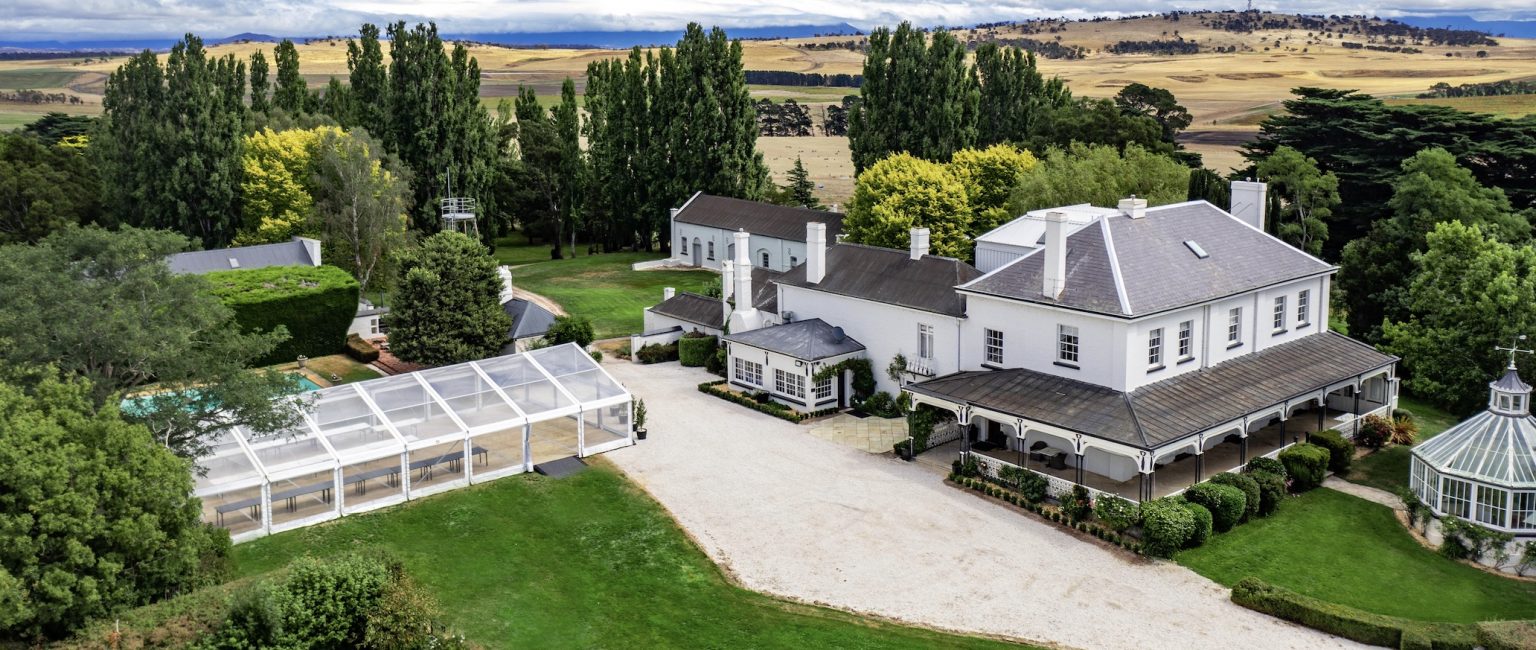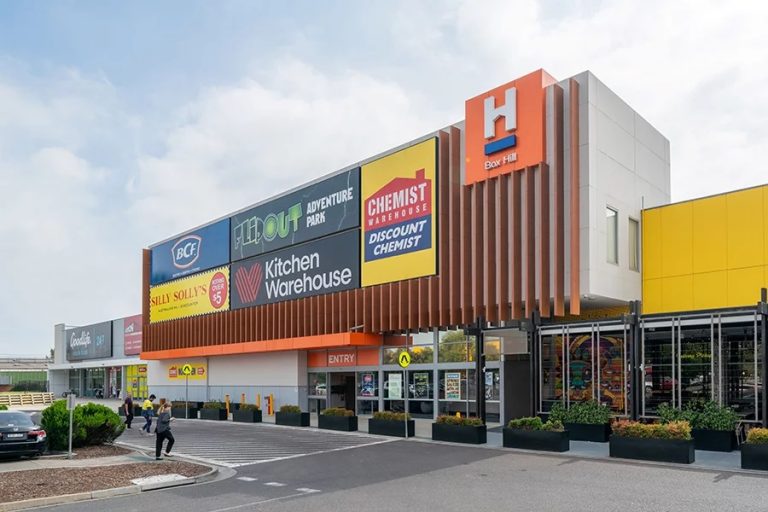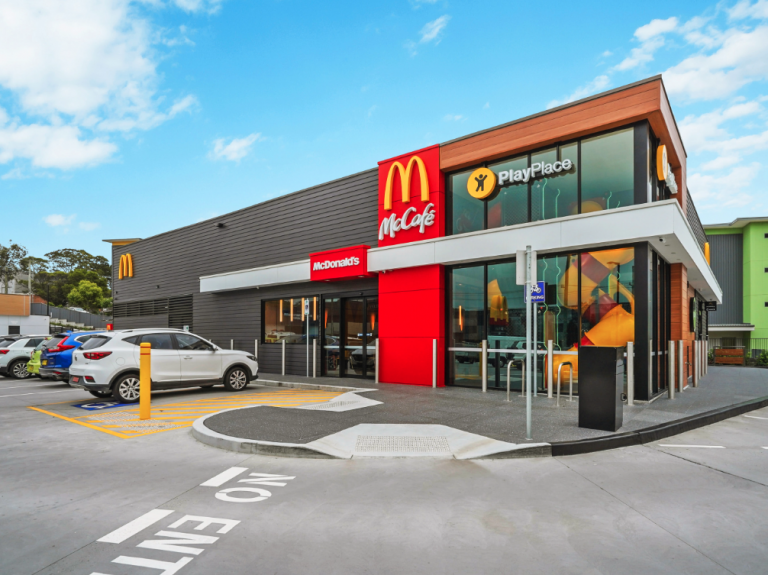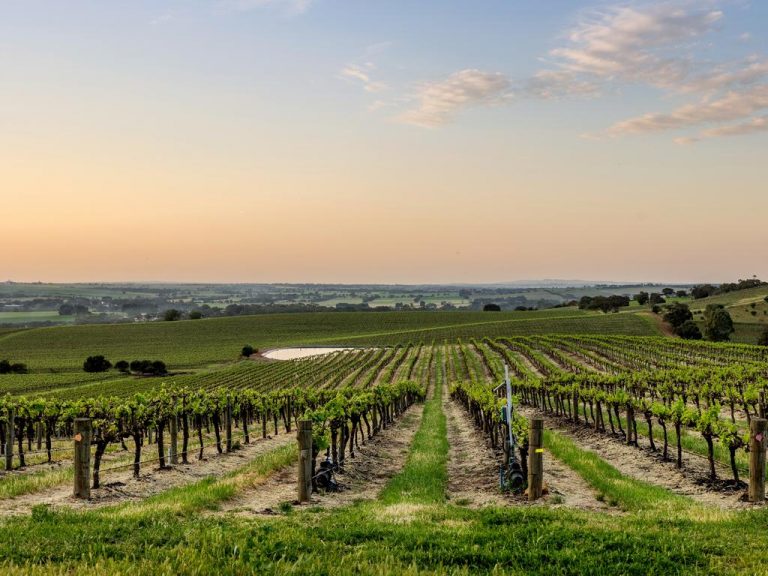Historic Tasmanian homestead and farm attract creme de la creme

An historic Tasmanian homestead and farm are drawing interest from across the country and the world.
The Vaucluse portfolio is not your average property, turning the heads of even its sales agents thanks to its inclusions, size, and history.
The 4448ha property, located 55km south of Launceston, comprises two 1830s homesteads: the heritage-listed, 10-bedroom Vaucluse homestead licenced for weddings and other functions and the five-bedroom Glen Esk homestead.
There is also a refurbished two-bedroom coach house open for short-term rental accommodation as well as a manager’s residence, two cottages, an office, stables complex, a pool and a pool house.
The farming sector of the property includes 2600ha of cropping and grazing land, massive water irrigation capacity, a shearing shed, machinery shed and cattle yards as well as the nearby Powranna grain storage facility with six silos.
Land Agribusiness Water Development (LAWD) real estate agency and advisory firm senior director, Danny Thomas, described the impressive combination of historical residences and farmlands as very rare, with the portfolio attracting interest from Tasmania, Victoria and Queensland as well as Europe and North America.
“It’s appealing to high-net-worth private investors, well-established farmers and global institutional investors who plan to continue to operate the property as is,” Mr Thomas explained.
Farmland increases historic portfolio
Mr Thomas isn’t new to Vaucluse after marketing just the Vaucluse Homestead with his co-agent, LAWD director Elizabeth Doyle, in 2018-2019 when both of them worked at CBRE.
However, the property failed to sell and is still owned by international private equity firm, Proterra Investment Partners, who purchased the property for $20 million in 2015 before amalgamating it with two adjacent properties worth a total of around $45 million.

Picture: realcommercial.com.au
The Vaucluse portfolio is one of three major Proterra-owned agricultural assets, priced at more than $400 million in total, currently on the market as part of the firm’s 10-year exit strategy from Australian farm assets.
Former owners have grown potatoes, poppies, grass seeds, canola and cereals on the property and also run merino sheep and Angus cattle.
Proterra managing director, Becs Willson, said the company had put a strong focus on developing Vaucluse to be one of the Apple Ise’s largest grain producers.
“Operating a five-year crop rotation across the farm, we have established Vaucluse as a high-calibre, large-scale cereal producer … and by investing heavily in water infrastructure and agronomics, we have significantly improved yields,” Ms Willson said.
Property draws “remarkable” buyer interest
As of the Easter weekend, Mr Thomas said the Vaucluse portfolio had attracted 110 inquiries and more than 20 inspections, which he said was remarkable considering its price guide in excess of $100 million.
“This is a very special asset and these are the creme de la creme of prospective purchasers,” Mr Thomas said.
He added that only one person had inquired about purchasing just the portfolio’s main accommodation homesteads, Vaucluse and the Coach House, which are both on one title.
However, he said this singular interest could be due to the marketing campaign not highlighting this option.

Picture: realcommercial.com.au
But for those who appreciate history, the Vaucluse Homestead alone presents a wealth of it.
Once a two-storey brick farmhouse built close to the South Esk River, flooding resulted in a new home being constructed on the homestead’s current site in the 1820s.
The four-storey brick and stucco mansion was completed in 1830 and after major renovations in 1940 and 1997 is now a stunning Georgian-style property which has housed state governers and hosted hunts and picnics.
Every bedroom includes an ensuite and there is also a commercial kitchen, formal dining room, library and glass conservatory.
An elevator provides access to all three levels, which overlook landscaped gardens.
Apple Isle’s appeal continues to grow
Knight Frank Tasmania agri-business agent, Rob Dixon, says there is a continuing strong appetite for unique assets like Vaucluse.
Mr Dixon and his Launceston agency have had plenty of experience in selling heritage-listed homes in Tasmania, with a colleague selling the 1879-built Bentley homestead and cattle farm last year.
While the sale price was undisclosed, the 395ha property in Chudleigh Valley was marketed for in excess of $15 million.
“Tasmania remains high on the radar for local, interstate and international investors who are driven to the state’s key aspects of secure irrigation water, lifestyle value and historic significance,” Mr Dixon said.
Mr Dixon added that interstate and international investors were particularly interested in homestead “agri offerings”, which form part of Tasmania’s important farming history.
“Buyers are being drawn to rural holdings with significant homesteads with many of these homes to be retained as prestige homes for owners rather than utilised as short-term accommodation,” Mr Dixon said.

Picture: realcommercial.com.au
While COVID has had a destructive impact on these homesteads’ agri-tourism outlook, Mr Dixon said many owners were now focusing on the return derived from farming operations rather than accommodation income from agri-tourism.
Yet even a global pandemic hasn’t curbed buyer interest in the Apple Isle.
PropTrack economist Anne Flaherty said buyer searches for Tasmanian hotel and leisure assets had grown by 29% in the 12 months ending March 31, well above the 9% growth seen in Australia as a whole.
Meanwhile, Tasmanian farm searches rose by 12% in this period, a sharp contrast to Australia’s overall farm searches which held steady over the past 12 months, slipping by just 1%.
“Tasmanian real estate is attracting interest from mainland Australia due to changing work practices which have allowed people to move from capital cities in favour of lifestyle regions,” Ms Flaherty explained.
“COVID lockdowns also drove a significant number of older workers to bring forward their retirement, and a proportion of this cohort has made the move to Tasmania.”
The Vaucluse portfolio is for sale via expressions of interest, with the first stage closing Thursday, April 28 at 4pm, and a price guide of over $100 million.







